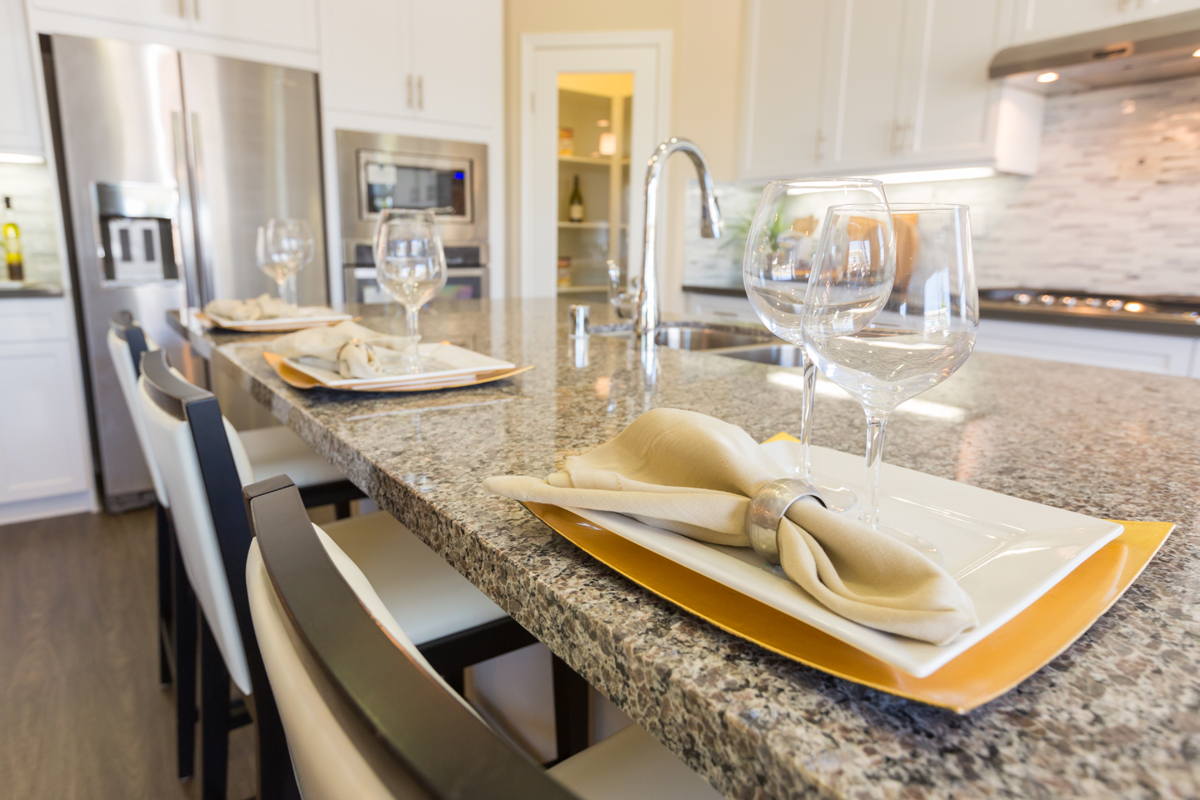If you notice some hard water stains building up around your faucet after cleaning your granite countertops, it’s vital to know exactly how to get rid of these stains. Use our step-by-step guide below!
What Is Hard Water?
Hard water will be produced when water filters through deposits of chalk, gypsum, or limestone. This water can be high in calcium and magnesium, which can be problematic depending on the setting the water is used in.
The issues arise when the water causes boilers to malfunction in industrial settings or creates a soap formation. This can clog up shower or laundry valves inside your home.
How To Get Rid Of Hard Water Stains From Granite
How do you go about eliminating these pesky hard water stains from your granite countertop? Follow these steps.
Step 1. Clean The Granite Countertops
- It’s always suggested to clean your granite countertops on a regular basis.
- Most homeowners will wipe up spills immediately, but this can leave behind soap scum.
- For this reason, you will need to rinse the area to remove any soap scum that can dull the surface.
- You must dry the surface after wiping.
- Use a microfiber cloth to soak up all the water and avoid scratching the sealant.
Step 2. Use Stone Cleaner
- Choose to use a natural stone cleaner instead of mild dish soap and water.
- Not only will this specialized solvent keep the finish looking shiny and clean, it will also help preserve the sealant.
- This natural stone cleaner minimizes the risk of harm to the granite when applied.
Step 3. Treat Any Water Spots
- It’s crucial to address hard water stains as soon as you notice them.
- Doing so immediately can prevent buildup that leaves behind hard, scaly deposits.
- Simply apply a gentle cleanser to get rid of the stains early on.
- Natural stone cleaner or dish soap and water will work.
- Scrub the solution with a sponge or soft-bristled brush.
- Thoroughly dry the area.
Step 4. Create A Paste
- If the hard water stains have solidified into scales, it’s time to use something stronger.
- You can treat stubborn stains with a paste of baking soda and water.
- Apply this to the affected area and scrub it with a soft-bristled brush.
- Rinse the area with water, then dry it completely.
Step 5. Try A Poultice
- Poultices can refer to any pasty or moist application that’s designed to extract something from a surface.
- You can either purchase granite poultice products or make your own at home.
- You can make this paste using baking soda and water.
- Apply the paste to the affected area, cover it with plastic wrap and let it sit for 24 hours.
- Wipe the poultice away and reapply, if needed.
Step 6. Use A Razor Blade As The Last Resort
- The use of a razor blade should always be the last resort when attacking hard water stains.
- Always be mindful not to cut into the sealant.
- When carefully scraping away at the mineral deposits, you can get rid of them without causing damage to the granite countertop.
Step 7. Seal Regularly
- While maintaining the sealant on the granite won’t stop hard water stains, it will help protect the granite from any long-term damage.
- This damage can be caused by mineral deposits that linger.
- Seal your surface regularly.
Salt Works USA In Arizona
At Salt Works we strive to meet the salt delivery needs for the entire Phoenix valley. Proudly serving the great state of Arizona for over 20 years, Salt Works has become a leading provider for salt and water treatment needs by earning the trust of our valued customers. We promise to build on our strong foundation and reputation through exceptional customer service and quality of our products. Contact us today!







